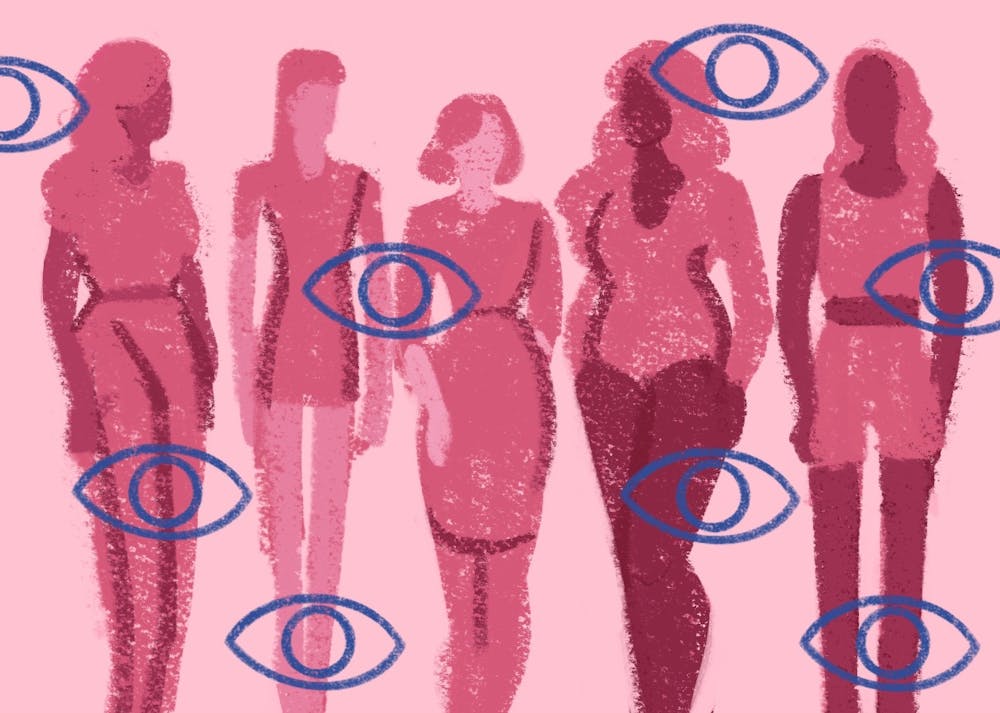Growing up, being of Latin descent was something I never would've considered to be anything but a privilege.
Growing up in a city where 64.2% of the population was Latine or Hispanic, I'd never really been exposed to racism, but I'd always heard stories from the news, so it wasn't a new concept. Something I hadn't expected, though, was the sexualization of my culture.
It happened for the first time when I was 16. I was working as a hostess at a fancier restaurant in a nice neighborhood that was predominantly caucasian, but most of the staff was Latine.
A few from my team of hostesses were assigned to help seat a table of men, when one of the men started to strike up a conversation between a fellow Latina hostess and me. He asked for our last names and whether we were Hispanic, and when we proudly told him "yes," things started to get weird.
The customer asked us to say words in Spanish for him. At first, we thought he was interested in learning about the language, but then he rolled his eyes back and turned to his friends at the table and said, "See, this is why I want to date a Spanish woman. They sound so hot."
Since then, a part of me has always been hesitant to express my heritage to other people, and until recently, I never understood why I had begun to fault myself for the way other people perceived my ethnicity.
It wasn't my fault nor my co-workers'. The blame for sexualizing Latina culture is with the white male gaze.
"Society from a very early (stage) teaches women their value is for sex, breeding and male pleasure," said Amanda Dielman, a freshman studying interior design. "We then normalize affairs, and stereotypically this will be with a non-white woman who is an 'exotic' beauty."
This idea of a Latina woman — long legs, dark skin, curvy hips, red lips, and large breasts topped with a "sensual" and "exotic" accent — has persisted in modern society.
"People frame … Latina women in media in a more sexual way," said Hannah Mason, a freshman studying nonprofit leadership and management. "I saw ... people objectifying them because of both their race and because they were women. And, obviously, every woman gets objectified to a certain extent in just our day-to-day lives, but I thought (it was) in a more intense way."
A common stereotype placed upon Latinas is that we are promiscuous, hotheaded and completely clueless when it comes to social cues because we're from another culture.
And modern media has not helped dispel these harmful stereotypes, either.
According to the research article "Sexualization in U.S. Latina and White Girls' Preferred Children's Television Programs," "Latina characters in mainstream media are often marginalized and sexualized in a centuries-old process of 'exoticizing' or 'tropicalizing' Latinas."
This type of sexualization of Latina girls and women contributes to higher rates of disordered eating, according to the article.
The standardization of hypersexuality is thrown onto Latina women, as it was onto me, at such young ages. It not only has a negative impact on our perception of our culture, but also ourselves. Latinas are more than what society wants or expects us to be.
Selena Quintanilla is considered one of the best Latina artists in Tejano history, but no one exclusively associates her with the "sensual" way her hips moved, they associated her with her ground-breaking music.
If we present ourselves to be sexual, it is because there is a difference between being sexual as an individual and sexualizing an entire culture; one is an individual choice and the other is something cast upon us that we do not accept as our own.
Latinas' identities are not for male pleasure, because our identities are ours and ours alone.
Reach the columnist at amvald11@asu.edu and follow @anxieteandbread on Twitter.
Editor’s note: The opinions presented in this column are the author’s and do not imply any endorsement from The State Press or its editors.
Want to join the conversation? Send an email to opiniondesk.statepress@gmail.com. Keep letters under 500 words and be sure to include your university affiliation. Anonymity will not be granted.
Like The State Press on Facebook and follow @statepress on Twitter.
Continue supporting student journalism and donate to The State Press today.

Analisa Valdez is a reporter with the Echo, focusing on covering the arts and entertainment world. Analisa has been apart of the State Press for two and a half years and is in her third year at the Walter Cronkite School of Journalism and Mass Communication.




